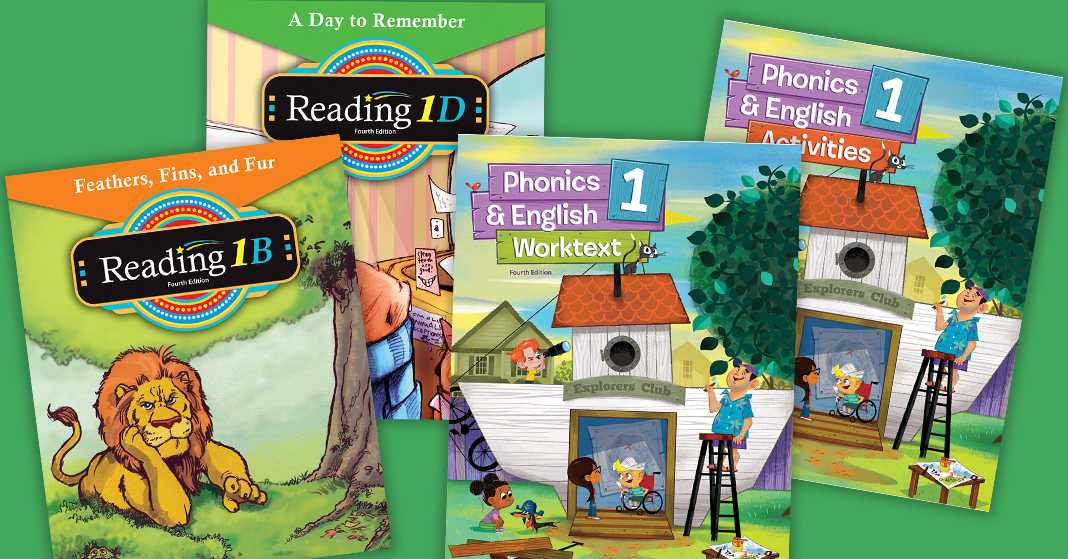
It’s wonderful to have options when you’re teaching your children. When something doesn’t work, you can always try something else and keep at it until your kids get what you’re teaching. So a lot of homeschool families wind up using curriculum from a bunch of different publishers for a single grade. And it works. But BJU Press has designed certain subjects to support each other in unique ways. Specifically, students who use Phonics and English 1 and Reading 1 together will be better equipped to be confident readers.
In K5, all of English language arts are integrated—you teach it all together. But in Grade 1, English and reading count as separate subjects. They’re separate, but they still correlate. The concepts and progression of skills support each other in both subjects. If you use a different curriculum for English or reading, then your child will miss the benefits of a correlated reading program and may find learning to read harder than it needs to be.
Opportunities for Practice and Review
Practice and review opportunities are an intrinsic part of each BJU Press textbook. Children need to see concepts repeatedly to develop automaticity—the ability to do something without thinking about it, or automatically. But when they’re just learning to read, children need more practice and review opportunities of the phonetic concepts they learn in English than are provided in the textbook itself. Reading 1 follows the same progression of skills as Phonics & English 1, so that children will find more opportunities for practice and review of concepts they learned in English while doing their reading books.
Application Skills
What’s the difference between practice and application? When we’re practicing a concept, we’re usually seeing the exact same concept over and over again. The more we see it, the more familiar it will be. But application is actually a little different. Application introduces a familiar concept in a new situation. It gives us a chance to apply what we know to figure out what we don’t know. It’s a critical thinking skill that most of us use regularly even if we don’t realize it. Because Phonics & English 1 and Reading 1 correlate to introduce and develop concepts at the same time, children will not only learn a new concept, but also have the opportunity to apply it.
For example, a phonics lesson might introduce the _at word family. Your child has practiced reading the words at, cat, and bat as a part of the phonics lesson. Later, in his reading lesson, he finds a new word, hat. Because he knows the h sound and he knows the _at word family, he can apply what he knows about the two sounds and read the new word. As he learns to recognize new words based on what he knows, his confidence in reading grows.
Please note that, while the progression of concepts do correlate, the lesson numbers don’t always correlate. There are fewer reading lessons than there are phonics lessons. This helps children to stay ahead in phonics and to master concepts in reading. We have created a correlation chart to show you which lessons you should be teaching together.
Prepared to Be Confident Readers
When English and reading lessons support each other by adding practice and application, your child will be better prepared to learn new skills and concepts going forward. First, she learns the skills she needs to be successful in Phonics and English 1. Then, she learns to use and expand on those skills in Reading 1. When she comes back for another English lesson, she’ll be prepared for it because she’s had time and opportunity to practice and apply what she learned before. She’ll have more confidence and certainty about what she knows in both English and reading.
Dangers of Mixing Curriculum
But what can happen if your English curriculum and reading curriculum don’t support each other? Your English materials may not prepare your children adequately for what they’ll encounter in reading, and their reading program may not give them the practice and application they will need to be confident in their phonics and English lessons. Programs that don’t correlate often introduce skills at different times. Children who are constantly running into new skills that they aren’t prepared for will either become overwhelmed by learning, or they’ll resort to guessing. Guessers can easily become confused and frustrated when they don’t understand why their guesses are right or wrong.
It’s easier to encourage your children to become lifelong readers when they have confidence in reading. Children who become confident readers are more equipped for success because they will be better prepared for the reading challenges they will face in later grades.